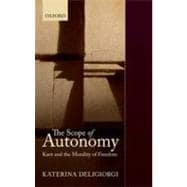
Note: Supplemental materials are not guaranteed with Rental or Used book purchases.
Purchase Benefits
Looking to rent a book? Rent The Scope of Autonomy Kant and the Morality of Freedom [ISBN: 9780199646159] for the semester, quarter, and short term or search our site for other textbooks by Deligiorgi, Katerina. Renting a textbook can save you up to 90% from the cost of buying.
| List of Abbreviations | p. xv |
| Introduction. Autonomy: Specification of a Term, Recognition of a Problem | p. 1 |
| Kantian autonomy as co-legislation: a preliminary characterization | p. 6 |
| The many faces of Kantian autonomy | p. 17 |
| Nomos: the bond of freedom and the scope of autonomy | p. 24 |
| Moral Knowledge: Pure Reason and the Law | p. 32 |
| Kantian moral cognitivism: motivation for a defence | p. 35 |
| Universalizability: A test for moral truths without moral facts | p. 44 |
| Moral experience: the epistemic value of ordinary moral concepts | p. 49 |
| Practical reason and apriority | p. 56 |
| Moral Action: Motivation, Normativity, and Autonomous Willing | p. 63 |
| Kant, reasons for action, and acting for a reason | p. 64 |
| Reason in action: the psychological interpretation | p. 70 |
| The metaphysics of agency: obligatoriness, inescapability, necessitation | p. 84 |
| A cumulative argument: doxastic relevance and practical freedom | p. 93 |
| Back to the everyday: motives, norms, and the ends of reason | p. 98 |
| Freedom as Constraint: The Morality of Autonomy | p. 105 |
| Subject to the law: difficulties with autonomy | p. 109 |
| Practical identity, practical context, and the moral point of view | p. 118 |
| Apriority, 'the dear selfÆ, and moral possibility | p. 130 |
| Knowing Hearts: Emotion, Value, and Judgement | p. 142 |
| Why emotions matter: Kantian austerity on trial | p. 145 |
| Three Schillerian moral emotions and some contemporary rejoinders | p. 150 |
| Autonomy and moral life: Kantian responses | p. 162 |
| The Scope of Autonomy: Agency, Freedom, and Morality | p. 173 |
| Authenticity, integrity, independence, freedom | p. 174 |
| A Hegelian path to worldly agency and some obstacles | p. 185 |
| The Kantian alternative: freedom and the 'causality of reason' | p. 191 |
| Optimists and pessimists: context, practice, and the limits of theory | p. 202 |
| Bibliography | p. 211 |
| Index | p. 229 |
| Table of Contents provided by Ingram. All Rights Reserved. |
The New copy of this book will include any supplemental materials advertised. Please check the title of the book to determine if it should include any access cards, study guides, lab manuals, CDs, etc.
The Used, Rental and eBook copies of this book are not guaranteed to include any supplemental materials. Typically, only the book itself is included. This is true even if the title states it includes any access cards, study guides, lab manuals, CDs, etc.